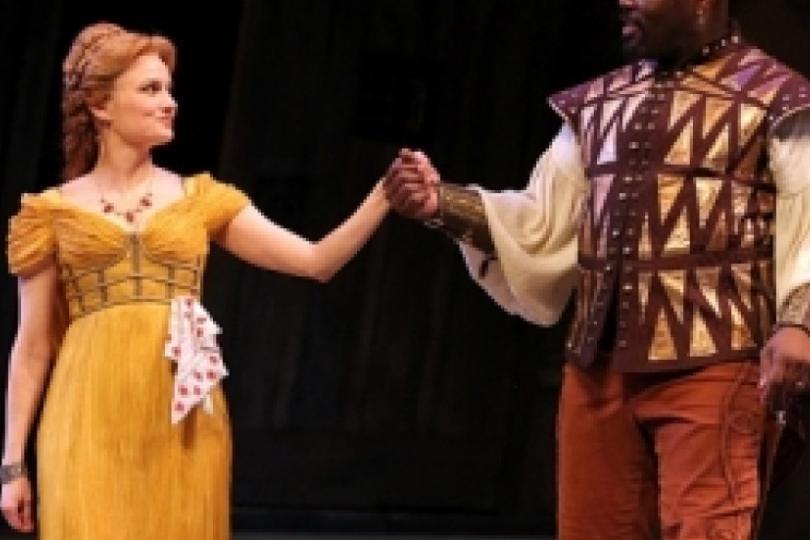Reviewing the reviews: Who is this for?
Editorial

One question I keep coming back to while writing these columns: who exactly is the intended audience for mainstream criticism? Are theater reviews meant for casual theatergoers trying to pick a show for a night on the town? Regular patrons interested in the nuances of a particular production? Theater people looking for useful feedback on their performances? An ideal mass-audience review would contain something for each of these constituencies, but that’s a mighty tall order.
I return to this well because I recently received a note from a reader perplexed by a review in the Pioneer Press. The reader had a litany of complaints about Dominic Papatola’s review of the Guthrie’s production of Othello, most of which boiled down to “Who was this review written for?” After reading Papatola’s piece a number of times, I have to admit that I still can’t answer that question.
The confusion begins with an opening paragraph focused entirely on the show’s running time. While a three-hour production is on the longer side, it’s certainly not unheard of, especially when you’re dealing with a traditional adaptation of a well-known commodity. Papatola says potential attendees “will be forgiven their undoubted small groan” at the play’s length. I suppose a three-hour time investment might be off-putting to folks looking for a quiet date night or high school kids looking for a shortcut in their required reading, but I have to assume that an audience willing and able to pony up for a $70 theater ticket can handle a few hours at the Guthrie. Regardless, leading off a review with a disclaimer about the play’s length (and calling back to it two more times before the piece is done) is just weird.
The second paragraph does make clear one potential audience. "If you're a newcomer to Shakespeare, Othello is a pretty good place to begin," Papatola opines before laying out a brief primer on the plot and characters. I agree that Othello is a good entry point to Shakespeare, but again, it's tough for me to imagine many people flipping through the Pioneer Press and saying, "I keep hearing good things about this Shakespeare guy. Maybe I should check this out. Ooh, and there are some pretty good balcony seats for only 43 bucks!"
The focus on first-timers seems especially odd because the review doesn't make this production seem like the most enticing introduction. Recalling The Onion's classic "Unconventional Director Sets Shakespeare Play in Time, Place Shakespeare Intended" article, Papatola notes that "McClinton's production is surprising in its conventionality: He doesn't transport the action into some anachronistic time period."
Throughout the review, it seems as though Papatola is leaning toward criticizing the production for being dull or pedestrian, but he never quite says it outright. Instead he damns it with reserved praise. Director Marion McClinton's techniques are "solid" but "do not stray far from the stereotypical Big Guthrie Shakespeare Staging." Lead actor Peter Macon hits an early peak but is only "sporadically successful" at regaining the same intensity in the play's second act. Both the play and the actors evince that there's "a hair's breadth between a very good performance and a great one."
There's nothing wrong with that approach, of course. In fact, it's rather refreshing to see a critic articulate the frustration of seeing art that comes close to greatness but falls just short. In many ways, that can be a more disappointing experience than seeing something that's flat-out bad. My concern is that it sometimes reads as if Papatola is judging this Othello against his ideal rather than on its own merits. He presents the conventional staging as a negative and reserves his highest praise for "subversive moments" like the casting of Regina Marie Williams, an actress of color, as Iago's wife Emelia. He gives Tracy Maloney mild credit for her physicality but is disappointed that "her Desdemona feels acted-upon and lacks a sense of agency."
All of this gives me the impression of a critic who simply wished he was watching a different production than the one on stage. Papatola comes off as thoroughly unenthused about the traditional staging, getting excited only over McClinton's occasional dabs of unorthodoxy. But as uninspired as he seems to be, he can't find specific fault with much. This leads to things like a running commentary on the play's length, curious presumptions (Emelia was "was likely a role of convenience" for Shakespeare) and head-scratching quibbles (isn't being acted upon pretty much Desdemona's thing?).
The review reads like the work of a critic who was bored with the play and even more bored with having to write about it, but who doesn't quite want to call it a boring production. Papatola's disengagement becomes all the more evident when contrasted with Graydon Royce's take in the Star Tribune. It helps that Royce clearly liked this Othello more than Papatola did – writing a glowing review is usually easier and more fun than writing a tepid one – but even beyond that the difference in energy is unmistakable. In Royce's estimation, "McClinton paints the cunning and the heartbreak of this Shakespeare tragedy with confident strokes of tradition." The "lean and muscular staging ripples across Marjorie Bradley Kellogg’s elemental stage design of stone floors and an azure horizon." Maloney's Desdemona "is the Moor’s delight, a jewel that radiates her own beauty and reflects his vulnerability."
I suppose some would say that Royce's approach is overwritten and too fond of its own voice, but damned if it isn't more fun to read. More importantly, it captures the electricity of being in the room witnessing something memorable unfolding on stage. It puts the reader in the moment because it's evident that the author is right there himself. I understand that a critic's gig sometimes feels like a slog. Sitting through play after play and trying to come up with new and interesting things to say about each one can be wearisome, especially when the material doesn't grab you. But it's part of the critic's job to push through that tedium, keep it off the page, and do your best to bring your audience the essence of your theatergoing experience.
Unless, of course, the tedium is the essence. In that case, own it and let the people know why it didn't click. Just don't take the middle ground. That doesn't do anyone any good.




